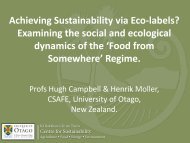Book of Abstract (incl. addendum) - IFSA symposium 2012
Book of Abstract (incl. addendum) - IFSA symposium 2012
Book of Abstract (incl. addendum) - IFSA symposium 2012
Create successful ePaper yourself
Turn your PDF publications into a flip-book with our unique Google optimized e-Paper software.
Workshop 1.3 Understanding agricultural structural changes and their impacts, to support<br />
<strong>incl</strong>usive policy dialogue and formulation<br />
Understanding farmers’ land rationales in the context <strong>of</strong> urban sprawl<br />
Christine Léger and Françoise Alavoine-Mornas<br />
Irstea, France<br />
Christine.Leger@irstea.fr<br />
Even if European and French policies aim at reducing agricultural land consumption for urban<br />
development, tnhe equivalent <strong>of</strong> one French department area is built each seven years. The<br />
implementation <strong>of</strong> French land use planning policies is supposed to integrate the cooperation <strong>of</strong><br />
agriculture pr<strong>of</strong>essionals, as a governance form <strong>of</strong> public intervention. Considering this, we assume<br />
that there are some learning failures in the cultural integration between politics and agricultural sectors<br />
which may explain some misinterpretations <strong>of</strong> farming systems issues. In this paper, we expose a<br />
method to unravel farming systems dynamics in the context <strong>of</strong> urban sprawl, as understanding this<br />
means integrating on one hand the complexity <strong>of</strong> agricultural working systems, on the other hand the<br />
complexity <strong>of</strong> the different impacts <strong>of</strong> urban sprawl on these systems. With this aim in view, we<br />
present a new way to study farmers’ strategies. Our approach is based on an analysis <strong>of</strong> farmers’<br />
decisions, coupled with their motivations. We identified five action levers and four distinct farmers’<br />
rationales with regard to land management decisions, and also their interdependencies. This method<br />
could also be used to study other types <strong>of</strong> farming systems’ structural changes.<br />
The activity system. A position paper<br />
Pierre Gasselin, Michel Vaillant and Benjamin Bathfield<br />
INRA, France<br />
Gasselin@supagro.inra.fr<br />
From a broad review <strong>of</strong> the literature and empirical studies conducted in Latin America and in France,<br />
we consolidate the concept <strong>of</strong> activity system applied to small-scale agriculture. This concept brings<br />
together fundamental works <strong>of</strong> various disciplines on the notions <strong>of</strong> activity, work, knowledge,<br />
resources, decision-making and rationality, dynamic <strong>of</strong> systems, innovation and development. It<br />
provides a global analytical framework that can be applied to a specific context and a given issue. This<br />
in turn imposes to define its components (social entity, activity, motivation and resources) and its<br />
environment. The study <strong>of</strong> the interactions and <strong>of</strong> the dynamics, especially in its historical dimension,<br />
is intrinsic to the activity system approach.<br />
WAW proposed methodological framework to assess agricultural structural<br />
transformations and their contributions to sustainable development:<br />
monitoring and assessment better to inform policy<br />
Pierre-Marie Bosc, Jean-Francois Bélières, Hubert George and Marie-Aude Even<br />
CIRAD, France<br />
Pierre-Marie.Bosc@cirad.fr<br />
Informed decisions on the diversity <strong>of</strong> agricultural holdings and the choice <strong>of</strong> future pathways <strong>of</strong><br />
agricultural transformation can play a decisive role in society’s response to several global challenges.<br />
To make such decisions - spanning policy, institutional and technical dimensions - it is essential to<br />
monitor objectively the extent and impacts (social, economic and environmental) <strong>of</strong> ongoing and mostlikely<br />
future pathways <strong>of</strong> transformation both at the detailed level <strong>of</strong> agricultural holdings as well as at<br />
larger ‘territorial’ scales. The World Agricultural Watch (WAW) is proposed as a platform for<br />
effective global monitoring <strong>of</strong> rural and agricultural transformation.<br />
35











